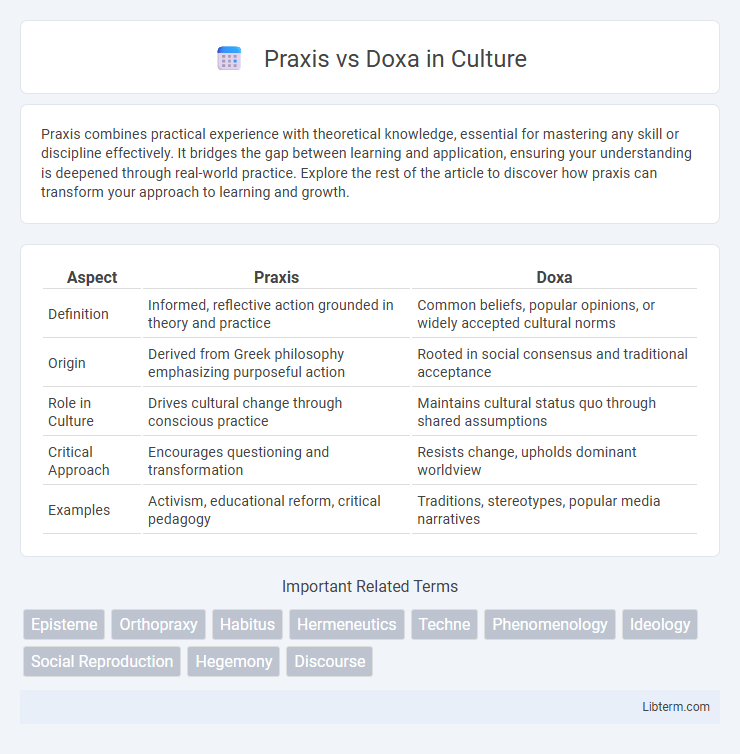Praxis combines practical experience with theoretical knowledge, essential for mastering any skill or discipline effectively. It bridges the gap between learning and application, ensuring your understanding is deepened through real-world practice. Explore the rest of the article to discover how praxis can transform your approach to learning and growth.
Table of Comparison
| Aspect | Praxis | Doxa |
|---|---|---|
| Definition | Informed, reflective action grounded in theory and practice | Common beliefs, popular opinions, or widely accepted cultural norms |
| Origin | Derived from Greek philosophy emphasizing purposeful action | Rooted in social consensus and traditional acceptance |
| Role in Culture | Drives cultural change through conscious practice | Maintains cultural status quo through shared assumptions |
| Critical Approach | Encourages questioning and transformation | Resists change, upholds dominant worldview |
| Examples | Activism, educational reform, critical pedagogy | Traditions, stereotypes, popular media narratives |
Defining Praxis: Meaning and Origins
Praxis, originating from ancient Greek philosophy, signifies the process of translating theory into practical action, emphasizing active engagement in ethical and political life. It contrasts with doxa, which refers to common beliefs or opinions without critical examination. Rooted in Aristotle's concept of "phronesis," praxis embodies reflective practice aimed at achieving transformative outcomes.
Understanding Doxa: Concept Explained
Doxa refers to commonly accepted beliefs or opinions within a society that shape individuals' perceptions and behaviors without critical examination. It represents the socially ingrained norms and values that often go unquestioned, influencing cultural practices and knowledge dissemination. Understanding doxa is essential for analyzing how power and ideology maintain dominance through seemingly naturalized truths.
Historical Development: Praxis and Doxa in Philosophy
Praxis and doxa have distinct roles in the historical development of philosophy, with praxis referring to informed, reflective action rooted in ethical and practical knowledge, while doxa denotes common belief or uncritical opinion often challenged by philosophical inquiry. Ancient Greek philosophers like Socrates and Aristotle emphasized praxis as essential for achieving knowledge and virtue, contrasting it with doxa, which represented mere opinion lacking rational foundation. This dichotomy evolved through modern philosophy, influencing critical theory and existentialism where praxis embodies transformative action, and doxa highlights culturally accepted norms subject to critique.
Key Differences Between Praxis and Doxa
Praxis refers to the process of putting theoretical knowledge into practical action, emphasizing experience and application, whereas doxa denotes commonly accepted beliefs or opinions without critical examination. Praxis involves reflective practice aimed at transformation and learning, while doxa represents unquestioned societal norms and assumptions. The key difference lies in praxis fostering active engagement and critical thinking, contrasting with doxa's passive acceptance of prevailing ideas.
Praxis in Action: Real-world Applications
Praxis emphasizes the transformation of theoretical knowledge into purposeful action within real-world contexts, driving practical solutions and social change. It involves reflective practice where continuous feedback between theory and implementation enhances effectiveness in fields like education, activism, and professional development. By prioritizing active engagement, praxis bridges the gap between abstract ideas and tangible outcomes, fostering innovation and meaningful impact.
Doxa in Society: Influence on Beliefs and Norms
Doxa represents the collective beliefs and norms ingrained within a society, shaping perceptions and guiding behavior unconsciously. These societal convictions form a framework for acceptable practices, reinforcing power structures and cultural continuity. Understanding doxa is crucial for analyzing how social expectations maintain dominance and inhibit critical questioning of established norms.
Major Philosophers on Praxis and Doxa
Major philosophers such as Aristotle emphasized praxis as practical action guided by ethical reasoning, contrasting it with doxa, which he viewed as common belief or opinion lacking critical examination. In Marxist theory, praxis is defined as transformative, conscious activity aimed at social change, while doxa represents the dominant ideologies that perpetuate the status quo. Paulo Freire further developed praxis as reflective action in education, opposing doxa as uncritical acceptance of prevailing norms.
Praxis vs Doxa: Implications for Critical Thinking
Praxis involves reflective, purposeful action informed by theory, while Doxa represents common beliefs or accepted opinions without critical examination. The distinction between Praxis and Doxa underscores the importance of critical thinking, as Praxis encourages questioning assumptions and applying knowledge to real-world situations. Emphasizing Praxis over Doxa fosters deeper understanding and challenges uncritical acceptance, enhancing analytical skills essential for sound judgment.
Challenges in Differentiating Praxis and Doxa
Differentiating praxis and doxa poses challenges due to their inherent conceptual overlap, where praxis involves intentional, reflective actions aimed at ethical transformation, while doxa refers to unexamined, socially accepted beliefs or opinions. The ambiguity in lived experiences makes it difficult to distinguish between actions driven by critical self-awareness (praxis) and those conditioned by prevailing societal norms (doxa). Moreover, this differentiation requires deep critical consciousness and continuous self-reflection to avoid conflating habitual practices with thoughtful, deliberate change.
Praxis and Doxa in Contemporary Discourse
Praxis in contemporary discourse emphasizes practical action and lived experience as means of knowledge production, contrasting with doxa, which represents commonly accepted beliefs or opinions without critical examination. Scholars argue that praxis challenges doxic assumptions by promoting reflexive, transformative practices that question dominant ideologies. This dynamic interplay between praxis and doxa shapes debates in education, politics, and cultural studies, highlighting the tension between critical engagement and passive acceptance in societal processes.
Praxis Infographic

 libterm.com
libterm.com